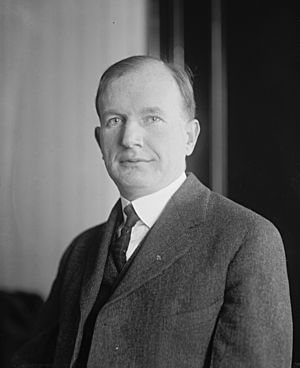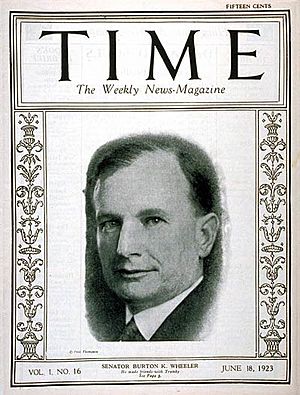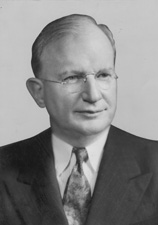Burton K. Wheeler facts for kids
Quick facts for kids
Burton Wheeler
|
|
|---|---|
 |
|
| United States Senator from Montana |
|
| In office March 4, 1923 – January 3, 1947 |
|
| Preceded by | Henry L. Myers |
| Succeeded by | Zales Ecton |
| United States Attorney for the District of Montana | |
| In office 1912 – October 1918 |
|
| Member of the Montana House of Representatives | |
| In office 1910–1912 |
|
| Personal details | |
| Born |
Burton Kendall Wheeler
February 27, 1882 Hudson, Massachusetts, U.S. |
| Died | January 6, 1975 (aged 92) Washington, D.C., U.S. |
| Resting place | Rock Creek Cemetery Washington, D.C., U.S. |
| Political party | Democratic |
| Other political affiliations |
Progressive (1924) |
| Spouse | Lulu White |
| Children | 6, including Frances |
| Education | University of Michigan (LLB) |
Burton Kendall Wheeler (February 27, 1882 – January 6, 1975) was an American lawyer and politician. He served as a U.S. Senator for Montana from 1923 to 1947.
Wheeler was born in Massachusetts. He started his law career in Montana by chance. As the U.S. Attorney for Montana, he became known for protecting civil liberties during World War I. He spoke out against the Sedition Act of 1918. He was an independent Democrat who supported progressive ideas. Labor unions in Montana helped him get elected to the Senate in 1922.
As a new Senator, Wheeler helped uncover a big government scandal called Teapot Dome. He ran for Vice President of the United States in 1924 with Robert La Follette Sr. on the Progressive Party ticket. Wheeler supported President Franklin D. Roosevelt's New Deal policies at first. However, he disagreed with Roosevelt's plan to change the Supreme Court. From 1938 to 1941, he was a leader against the U.S. joining World War II. He changed his mind after the attack on Pearl Harbor.
Wheeler lost his Senate re-election in 1946. He then worked as a lawyer in Washington, D.C. His time in politics is sometimes seen as controversial.
Contents
Early Life and Law Career
Burton Wheeler was born in Hudson, Massachusetts. His parents were Mary Elizabeth Rice and Asa Leonard Wheeler. He grew up in Massachusetts and went to public schools. His first job was as a stenographer in Boston.
He later moved west to study law at the University of Michigan Law School. He graduated in 1905. Wheeler planned to live in Seattle. But after getting off the train in Butte, Montana, he lost his belongings. He decided to stay in Butte and start his law practice there.
Political Journey
Early Political Steps (1910s)
Wheeler became a Montana state legislator in 1910. In this role, he became known for supporting workers. He often stood up against the powerful Anaconda Copper Mining Company. This company had a lot of control over Montana's economy and politics.
He was later appointed as a United States Attorney. During World War I, he refused to prosecute certain cases. He believed these cases would violate people's right to free speech. This was important because Montana had many members of the Industrial Workers of the World. In other places, their membership was restricted by the Sedition Act of 1918. Wheeler's actions were seen as unpatriotic by some. He also defended a socialist newspaper editor accused of sedition. Because of these actions, he was forced to leave his job as a U.S. attorney in October 1918.
Entering the Senate (1920s)

In 1920, Wheeler ran for Governor of Montana. He easily won the Democratic primary election. He also gained support from the Nonpartisan League. His campaign was unusual for 1920 because it included candidates from different racial backgrounds. These included an African American and a Blackfoot Indian. However, Wheeler lost the election to Joseph M. Dixon.
Wheeler ran for the U.S. Senate in 1922 as a Democrat. He won against Carl W. Riddick, the Republican candidate. He received 55% of the votes. In 1924, he left the Democratic Party for a short time. He ran for Vice President of the United States with Robert La Follette Sr. They were part of the Progressive Party. They won one state, Wisconsin, and did well in areas with many unions and railroad workers.
Early in his Senate career, Wheeler helped expose the Teapot Dome scandal. This was a major corruption scandal in the government. His special committee held important hearings. These hearings showed bribery and other problems in the Justice Department. This led to charges against the Attorney General, Harry M. Daugherty. In 1925, Wheeler himself was investigated, but it did not have a big impact.
After the 1924 election, Wheeler returned to the Democratic Party. He served four terms in total. He was re-elected in 1928, 1934, and 1940.
The New Deal Era (1930s)
In 1930, Wheeler became well-known across the country. He successfully campaigned for his friend, Senator Thomas Gore of Oklahoma, to be re-elected. Wheeler supported President Franklin D. Roosevelt's election. He also supported many of Roosevelt's New Deal policies.
However, Wheeler disagreed with Roosevelt on a major issue. He opposed Roosevelt's plan to change the Supreme Court. He also disagreed with much of Roosevelt's foreign policy before World War II. In the 1940 presidential election, some people wanted Wheeler to run for president. This movement was led by John L. Lewis.
In 1938, Wheeler proposed a Senate resolution. It stated that AM radio stations should be limited to 50,000 watts of power. This was to ensure fair competition. This resolution, known as the Wheeler resolution, was approved. The Federal Communications Commission later made this 50,000-watt limit a rule. It is still in place today.
World War II and Beyond (1940s)
Debates Before World War II
Wheeler was a strong supporter of non-interventionism. This meant he was against the U.S. joining World War II.
He strongly supported the America First Committee. This group wanted the U.S. to stay out of the war. Wheeler gave advice and many speeches to their groups. His wife, Lulu, was on the national committee. She was also the treasurer for the Washington, D.C., chapter.
Wheeler led a committee that investigated the motion picture industry. He questioned why many foreign-born people were influencing American opinion. Critics said this investigation was unfair. Wendell Willkie, who represented the studios, argued that Wheeler was trying to censor them. Wheeler also strongly opposed the Lend-Lease Bill. He said it would harm American youth. President Roosevelt strongly disagreed with Wheeler's statement.
On October 17, 1941, Wheeler said he could not imagine Japan wanting to go to war with the U.S. A month later, he added that if the U.S. went to war with Japan, it would only be to help England.
After Pearl Harbor
After Japan attacked Pearl Harbor, Wheeler changed his mind. He supported declaring war. He said, "The only thing now to do is to lick the hell out of them."
In 1945, Wheeler was one of seven senators who opposed the U.S. fully joining the United Nations.
Wheeler tried to be re-nominated for the Senate in 1946. But he lost in the Democratic primary to Leif Erickson. Erickson criticized Wheeler for his views before the war. Erickson then lost to Republican Zales Ecton. Wheeler's defeat was partly blamed on a pamphlet. This pamphlet was written by David George Plotkin. It accused Wheeler of being part of a conspiracy. A Montana writer called it "one of the worst books ever written" about a politician. It later came out that a political rival had supported the pamphlet.
Later Life (1950s)
On September 15, 1950, Wheeler helped his fellow Democrat, Max Lowenthal, as a lawyer. This was during Lowenthal's testimony before the House Un-American Activities Committee.
Wheeler did not return to politics. He continued his law practice in Washington, D.C.. With help from his daughter Frances, Wheeler wrote his autobiography. It was called Yankee from the West. It was published in 1962. He dedicated the book to his wife and daughter.
Family and Legacy
Burton Wheeler married Lulu M. White. She was an important political advisor to him. They had six children: John, Elizabeth, Edward, Frances, Richard, and Marion. Frances helped her father with research for his autobiography.
Wheeler passed away at age 92 on January 6, 1975, in Washington, D.C. He is buried in Rock Creek Cemetery. His home in Butte, Montana, is a National Historic Landmark. This recognizes his important role in national politics.
In 2004, writer Bill Kauffman described Wheeler. He said Wheeler was notable for being "anti-draft, anti-war, anti-big business defender of civil liberties."
See also
- List of United States senators expelled or censured
- Blair Coan
Images for kids
 | James B. Knighten |
 | Azellia White |
 | Willa Brown |





